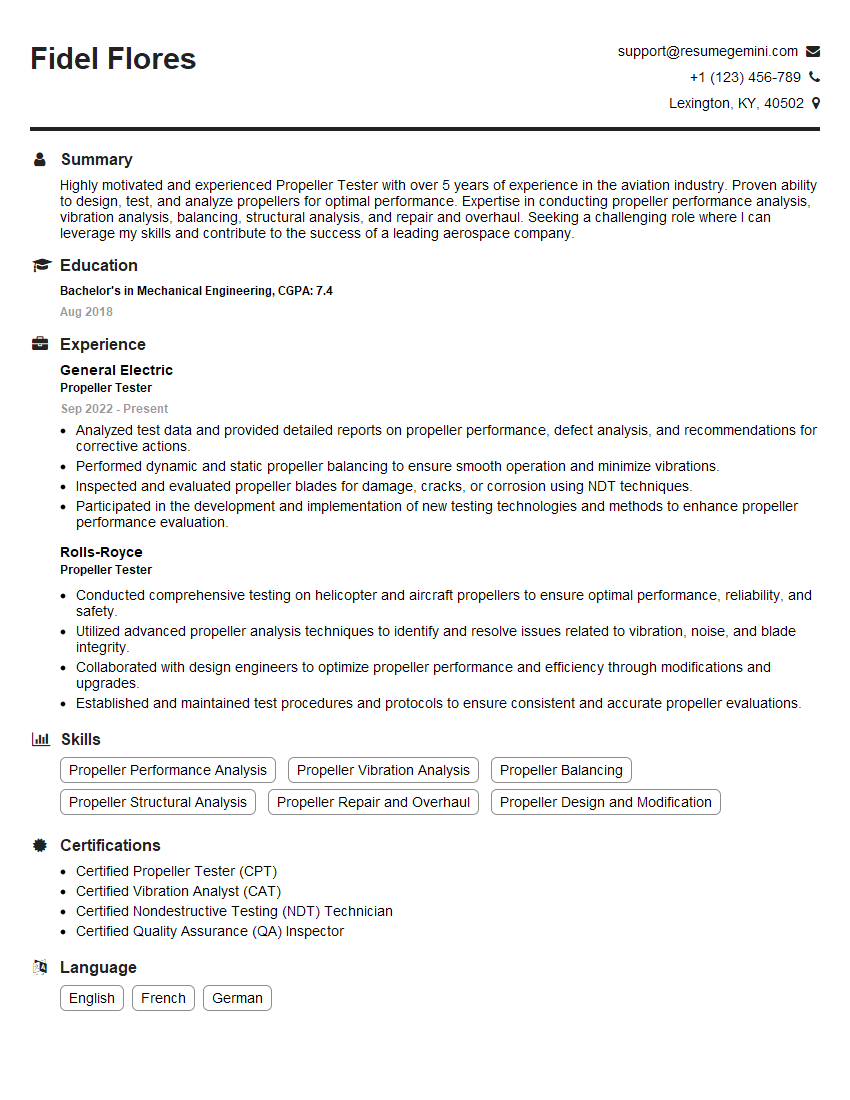Are you a seasoned Propeller Tester seeking a new career path? Discover our professionally built Propeller Tester Resume Template. This time-saving tool provides a solid foundation for your job search. Simply click “Edit Resume” to customize it with your unique experiences and achievements. Customize fonts and colors to match your personal style and increase your chances of landing your dream job. Explore more Resume Templates for additional options.

Fidel Flores
Propeller Tester
Summary
Highly motivated and experienced Propeller Tester with over 5 years of experience in the aviation industry. Proven ability to design, test, and analyze propellers for optimal performance. Expertise in conducting propeller performance analysis, vibration analysis, balancing, structural analysis, and repair and overhaul. Seeking a challenging role where I can leverage my skills and contribute to the success of a leading aerospace company.
Education
Bachelor’s in Mechanical Engineering
August 2018
Skills
- Propeller Performance Analysis
- Propeller Vibration Analysis
- Propeller Balancing
- Propeller Structural Analysis
- Propeller Repair and Overhaul
- Propeller Design and Modification
Work Experience
Propeller Tester
- Analyzed test data and provided detailed reports on propeller performance, defect analysis, and recommendations for corrective actions.
- Performed dynamic and static propeller balancing to ensure smooth operation and minimize vibrations.
- Inspected and evaluated propeller blades for damage, cracks, or corrosion using NDT techniques.
- Participated in the development and implementation of new testing technologies and methods to enhance propeller performance evaluation.
Propeller Tester
- Conducted comprehensive testing on helicopter and aircraft propellers to ensure optimal performance, reliability, and safety.
- Utilized advanced propeller analysis techniques to identify and resolve issues related to vibration, noise, and blade integrity.
- Collaborated with design engineers to optimize propeller performance and efficiency through modifications and upgrades.
- Established and maintained test procedures and protocols to ensure consistent and accurate propeller evaluations.
Certificates
- Certified Propeller Tester (CPT)
- Certified Vibration Analyst (CAT)
- Certified Nondestructive Testing (NDT) Technician
- Certified Quality Assurance (QA) Inspector
Languages
- English
- French
- German
Career Expert Tips:
- Select the ideal resume template to showcase your professional experience effectively.
- Master the art of resume writing to highlight your unique qualifications and achievements.
- Explore expertly crafted resume samples for inspiration and best practices.
- Build your best resume for free this new year with ResumeGemini. Enjoy exclusive discounts on ATS optimized resume templates.
How To Write Resume For Propeller Tester
- Highlight your technical skills and experience in propeller testing.
- Quantify your accomplishments and provide specific examples of your work.
- Demonstrate your understanding of the principles of propeller design and operation.
- Emphasize your ability to work independently and as part of a team.
- Showcase your communication and interpersonal skills.
Essential Experience Highlights for a Strong Propeller Tester Resume
- Conduct performance tests on propellers to determine efficiency, thrust, and noise levels.
- Analyze vibration data to identify and resolve any issues that may affect propeller performance.
- Balance propellers to ensure smooth and efficient operation.
- Perform structural analysis to assess the integrity of propellers and identify any potential defects.
- Overhaul and repair propellers to extend their lifespan and ensure continued safe operation.
- Develop and implement modifications to improve propeller performance and efficiency.
- Collaborate with engineers and technicians to design and manufacture new propellers.
Frequently Asked Questions (FAQ’s) For Propeller Tester
What is the role of a Propeller Tester?
A Propeller Tester is responsible for testing and evaluating the performance of propellers used in aircraft. This involves conducting various tests to determine the efficiency, thrust, and noise levels of propellers, as well as analyzing vibration data to identify and resolve any issues that may affect propeller performance. Propeller Testers also balance propellers to ensure smooth and efficient operation, and perform structural analysis to assess the integrity of propellers and identify any potential defects. They may also be involved in the design and development of new propellers, and in the overhaul and repair of existing propellers.
What are the qualifications required to become a Propeller Tester?
To become a Propeller Tester, you typically need a bachelor’s degree in mechanical engineering or a related field, as well as experience in propeller testing or a related field. You should have a strong understanding of the principles of propeller design and operation, as well as experience in conducting performance tests, vibration analysis, and structural analysis. You should also be familiar with the use of testing equipment and software, and have good communication and interpersonal skills.
What are the career prospects for Propeller Testers?
Propeller Testers can advance to more senior roles within the aviation industry, such as Propeller Design Engineer or Propeller Maintenance Manager. They may also move into management positions, such as Project Manager or Engineering Manager. With experience and additional qualifications, Propeller Testers can also become certified as Professional Engineers.
What are the challenges faced by Propeller Testers?
Propeller Testers face a number of challenges in their work, including: – Working with complex and potentially dangerous machinery – Dealing with high levels of noise and vibration – Working in confined spaces – Conducting tests in a variety of weather conditions – Meeting tight deadlines.
What are the rewards of being a Propeller Tester?
Propeller Testers are rewarded with a number of benefits, including: – Competitive salaries and benefits – Opportunities for career advancement – The chance to work on cutting-edge technologies – The satisfaction of knowing that their work is contributing to the safety and efficiency of aircraft.